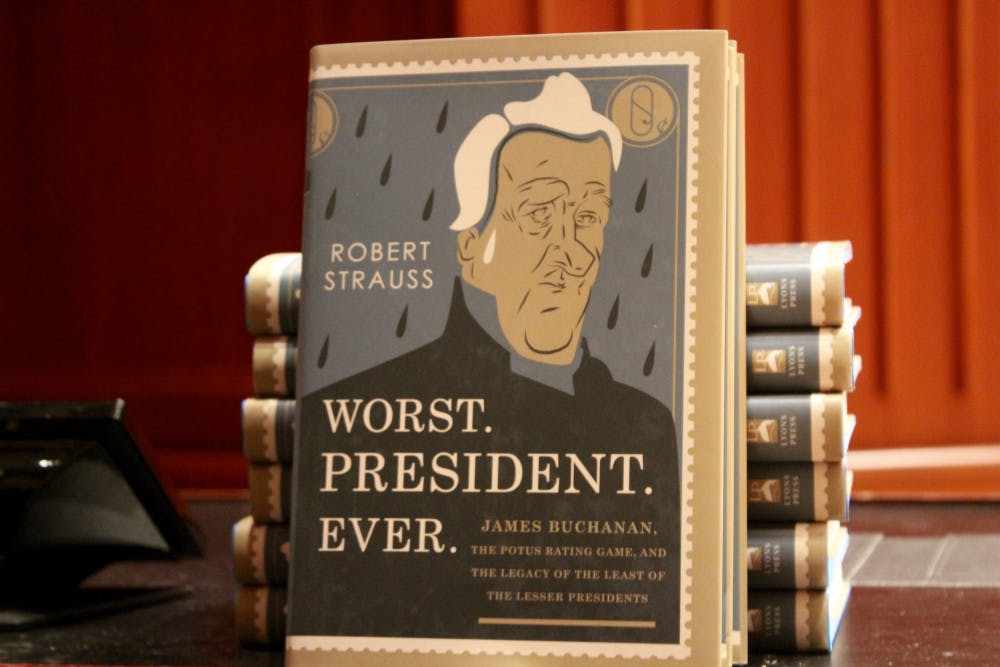By Sydney Shaw
Editor-in-Chief
If you think the 2016 presidential race is bizarre, journalist Robert Strauss has a message for you: “You haven’t seen anything.”
Strauss has written for publications such as Sports Illustrated and The New York Times, where he has had more than 1,000 bylines. His newest book analyzes the presidency of James Buchanan, whom Strauss dubs in the title the “Worst. President. Ever.”
His Brown Bag lecture on Friday, Oct. 21, emphasized that even though this election cycle might seem bitter, history reminds us it could be a lot worse.
“People always ask me, ‘Why don’t you write about Washington or Lincoln?’” Strauss said. “Everybody writes about the best. I wanted to find somebody who wasn’t so good, someone we could learn from.”

It’s hard to hold a candle to those two presidents. After all, no other president in history can be America’s first, and Strauss said it’s unlikely we’ll be faced with another civil war anytime soon.
According to Strauss, whether Hillary Clinton or Donald Trump can live up to the standards set by Washington and Lincoln is beside the point — neither candidate will be the worst president to lead the nation since its independence. But why does Buchanan take the cake?
As a Buchanan Pez dispenser rested on the lectern in front of him — one of his greatest artifacts on his office shelf, he said — Strauss explained that his path to that realization began in a small coin shop. He was searching for a coin to gift to his wife on their 25th wedding anniversary when he noticed that some of the coins from the late 1850s were much smaller than the older ones.
“Oh, the Panic of 1857,” the shop owner told Strauss. He explained that President Buchanan couldn’t figure out a solution to the country’s economic decline, so he opted for making smaller coins to utilize less gold and silver.
Strauss criticized Buchanan’s handling of the crisis, but noted that his ineffectiveness had far greater consequences, like the fumbling of the Dred Scott case, which is widely referred to as the worst Supreme Court decision in U.S. history.
“After his master died, Scott brought the case that he should be free because he had lived in nonslave territory,” Strauss wrote in a Politico article in September.
Buchanan ultimately ignored the separation of powers and convinced jurist Robert Cooper Grier to go along with the majority opinion that African Americans were not — and were never meant to be — citizens of the U.S., and that the property rights of slaveholders were protected by the Constitution.
Buchanan’s passivity during this crucial case — and throughout his presidency — is considered by many historians to be a contributing factor to the Civil War.
“Throughout his term, when a fork appeared in the road, Buchanan managed to take the wrong turn,” Strauss wrote in the same article.
Buchanan took another wrong turn when he caused entire villages in Utah to be burned to the ground because he thought a jurisdictional dispute was actually a Mormon revolt.
He sent troops to settle the “Pig War,” in which a settler along the Canadian border shot a pig owned by the Hudson Bay Co. that wandered onto his property, instead of keeping them in Kansas, where hostilities flared over whether it would enter the union as a slave or free state.
Besides recounting Buchanan’s past, Strauss analyzed the history of hotly-contested elections in U.S. history. He recognized that this year’s election cycle has been particularly vitriolic, but hinted that if it were the early 1800s, there might be more severe consequences than criticism in the media.
“I don’t think Hillary Clinton and Donald Trump are going to… duel,” he said, like Thomas Jefferson's vice president Aaron Burr did with former Secretary of the Treasury Alexander Hamilton.
Ultimately, Strauss said, the state of the union could be — and has been — a lot worse.
Before his lecture ended, Strauss left students with some food for thought: Whether you love or hate the two frontrunners, there’s one thing we can all agree on — neither of them started the Civil War.







